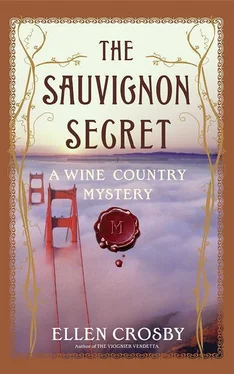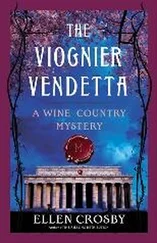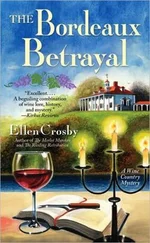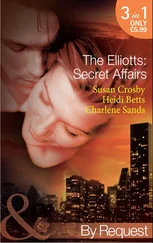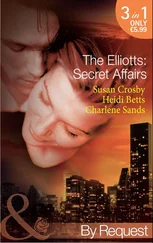We hadn’t said more than ten words to each other during and after lunch, but Quinn could have warned me about the winery. It was hidden around a bend at the bottom of a hill, masked by a pathway lined with wrought-iron arches graced by pastel climbing roses twining through them. The building looked like a miniature castle that had been plucked from old Europe, or a fairy tale. The mottled stone façade with its mossy crenellated parapet, multiple turrets, and two gargoyles leering at us from weathered corbels startled me so much that I stopped walking and stared at it.
“A change from your classic California mission architecture, huh?” he said.
If we were going to get through this meeting, we at least needed to be speaking to each other even though the lunchtime tension still hung in the air between us, thick as fog.
“You’ve been here before?” I was polite, but we had clearly drawn boundary lines.
“Nope. I’ve heard about it. Everybody around here knows it. Built by an eccentric guy with a trust fund and a taste for the slightly weird and offbeat. I think his family owned railroads in Canada. He blew through all his money before he ever finished the main house—that place is a real doozy. Kind of Gaudí meets Disney. The stories went that it had doors on the upper levels that opened to absolutely nothing and staircases that ended in midair since the workers just stopped construction from one day to the next,” he said. “For years it was an abandoned ruin that kids used as a place to get high or have sex. Then about ten years ago someone from the Central Coast bought the property and planted vines. They must have sold to Fargo, who, in turn, sold to Brooke.”
“What happened to the house with the doors and stairs to nowhere? Was it ever finished?”
He shrugged and held the door. “I guess we’ll find out when you ask for the nickel tour, won’t we?”
I walked past him and said coolly over my shoulder, “Yes, I guess we will.”
Brooke Hennessey looked up from doing paperwork at a bar on the other side of the room when she heard us come in. A shaft of light from an open leaded glass window lit her profile so that she looked like the medieval princess who inhabited the castle—heavy brows, dark long-lashed eyes, exquisite cheekbones, an aquiline nose, a serious mouth.
“Can I help you—?”
Her gaze shifted from me to Quinn and her hand flew to her throat.
Allen Cantor hadn’t been kidding about Brooke being a knockout. She was tall and slender, dressed in well-fitted black shorts that showed off long, tanned legs and a white T-shirt with a deep V-neck that hugged willowy curves. For a moment I could have sworn she was the younger sister of Quinn’s beautiful ex-wife, Nicole.
I heard Quinn breathe “whew” next to me as Brooke flew across the room and threw herself in his arms.
“Quinn! Where have you been? Oh, my God, it’s been ages. I’ve missed you so much.”
Quinn’s arms went around her like he was afraid she was going to break. So much for worrying about his presence screwing up this deal. Finally, he disentangled himself and introduced me.
Brooke blinked as she looked from Quinn to me, taking stock of my cane.
“You’re the one who called just now,” she said. “Lucie Montgomery. You’re from Virginia.” She turned to Quinn. “That’s where you went when you left. You two know each other?”
“I’ve been the winemaker at Lucie’s vineyard for the past few years,” he said.
Brooke’s mouth fell open and, for a second, her guard came down and I saw the old hurt in her eyes, how painful his departure must have been for her.
“Why didn’t you call me?” Her voice held a quiet note of reproach. “I had no idea you were coming. How long are you going to be in California?”
I wondered how he planned to answer that.
“It’s kind of complicated.” He looked uncomfortable. “Hey, Brookie, do you think it would be possible to taste that Cab?”
She smiled at the affectionate use of the nickname, though the abruptness of the request seemed to take her aback.
“Sure, no problem. It’s downstairs in the barrel room, of course. Or, as I like to call it, the dungeon.” Her eyes flickered to my cane. “There’s no elevator, only stairs. Is that, I mean—?”
“I can handle stairs. And dungeons.”
“If you’re sure.”
It almost sounded like she wished I’d said I couldn’t join them.
We’d reversed roles, Quinn and I, good cop, bad cop. Brooke was so captivated by him, so glad to see him again, that he probably could get a tour of her underwear drawer, if he’d asked. I had my doubts what she’d say if I inquired about Teddy Fargo’s off-limits-to-the-public gardens. Quinn was going to have to finesse this for us.
The wine was good—very good—just as Charles had promised. Neither Quinn nor I said anything, but it couldn’t have been Brooke’s. Teddy Fargo—Theo Graf—had made it. I wondered why it hadn’t crossed my mind before now.
It didn’t take us long to figure out the blend we wanted. Brooke’s eyes darted between the two of us and I caught the tiny flare of surprise as she realized how well we knew each other, how easily we slipped into a private, coded way of communicating that had been honed over the past four years.
After the paperwork was done, Quinn asked for a tour of the rest of the vineyard.
“I was hoping you’d ask.” She flashed a flirty smile at him.
Her bright red four-seater all-terrain vehicle was out by the crush pad. I got in back before anyone could say anything, so Quinn climbed in the passenger seat next to Brooke. She started the engine and gave us an overview of her land, much of which was woods stretching up the steep slopes of the hills behind the winery. The Gaudí-style castle, still unfinished, sat at the end of a road that branched off behind the orchard. Her home was a small stone cottage that would have been intended for a groundskeeper in grander days.
The vines—she had only six acres, planted in Cab, Zinfandel, Chardonnay, and Sauvignon Blanc—were terraced on stepped fields that surrounded the winery on three sides. Her vineyard was small and compact, but as Allen Cantor had said, that’s how she wanted it. I kept silent while she and Quinn talked about her trellising system, what she was doing for canopy management, her hopes for this year’s harvest. She was tight for start-up money, which was obvious; otherwise she wouldn’t have been selling her wine.
“The guy who owned the place before me was into organic pesticides.” She turned the steering wheel and swung the ATV down the Zinfandel block. “I’m following what he did, though it drives my dad nuts. But, hey, there’s no REI or PHI. It’s better for the grapes, better for the environment.”
REI stood for reentry interval, the amount of time after spraying before anyone could work safely in the vineyard; PHI was preharvest interval. Same thing. You couldn’t harvest grapes that were still coated with a potentially lethal pesticide, so PHI was critical: no spraying of toxic substances permitted a certain number of weeks before harvest. The time interval depended on the product.
I knew that Quinn’s eyes were rolling up into the back of his head as Brooke talked about organic spraying. He and I had the same discussion, regular as clockwork, every year: Organic pesticides may be better for people, but they aren’t effective at killing pests or fungus, especially with the climate we have in Virginia. So decide what you want, he’d say to me. A decimated crop because we sprayed the vines with nontoxic Bacillus thuringiensis , an organic product that didn’t require wearing masks or hazmat gear, or a guaranteed fruitful harvest because we suited up and used a heavy-duty pesticide that would really do the job, REI and PHI notwithstanding.
Читать дальше
